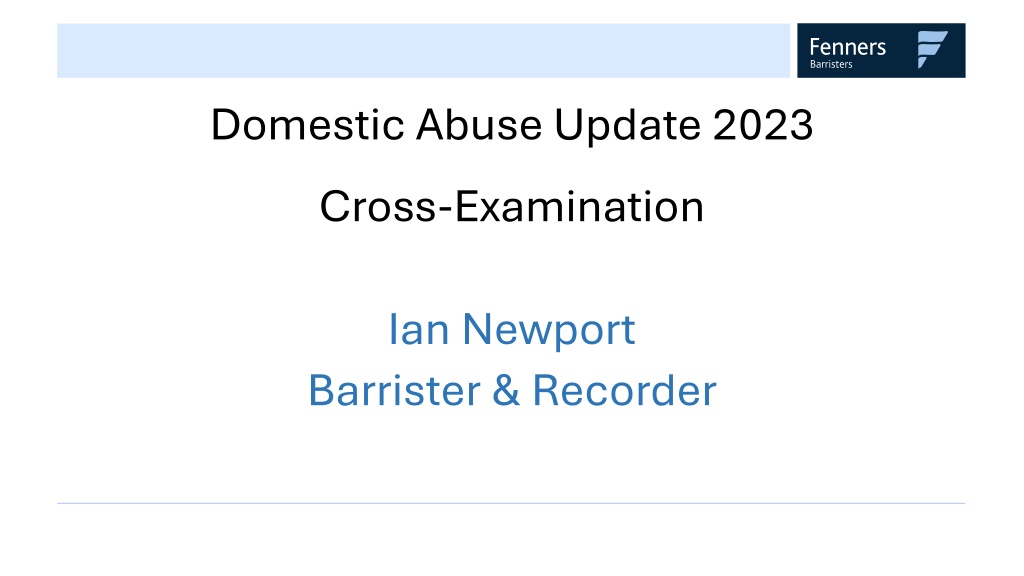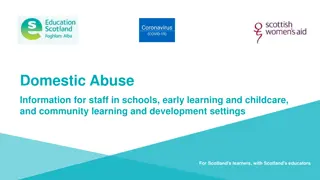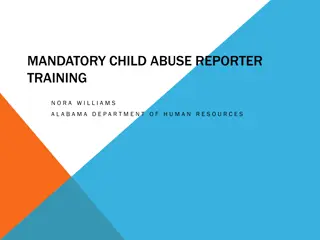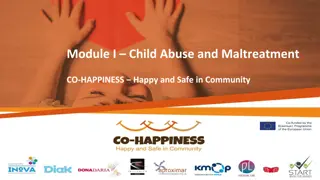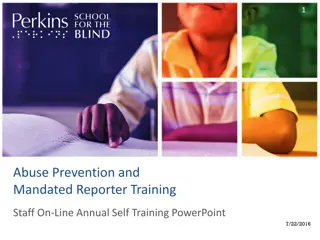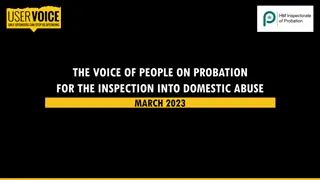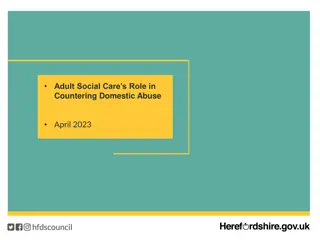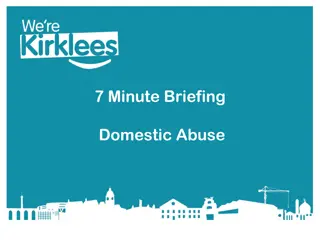Understanding Domestic Abuse Update 2023: Legal Insights & Responsibilities
The content details definitions of domestic abuse, responsibilities of the court in handling domestic abuse cases, and the amendments brought by the Domestic Abuse Act 2021. It includes information on identifying domestic abuse issues, protecting victims and children, and considerations for court proceedings. Key elements such as physical, sexual, economic abuse, and non-fatal strangulation are discussed, emphasizing the need to safeguard vulnerable individuals from harm.
Download Presentation

Please find below an Image/Link to download the presentation.
The content on the website is provided AS IS for your information and personal use only. It may not be sold, licensed, or shared on other websites without obtaining consent from the author. Download presentation by click this link. If you encounter any issues during the download, it is possible that the publisher has removed the file from their server.
E N D
Presentation Transcript
Domestic Abuse Update 2023 Cross-Examination Ian Newport Barrister & Recorder
Definitions in PD12J and ss1-2 DAA 2021 a) physical or sexual abuse; b) violent or threatening behaviour; c) controlling or coercive behaviour (note how these are defined in paragraph 3); d) economic abuse see PD12J 2A(4) e) psychological, emotional or other abuse. New offence of Non-Fatal Strangulation (s70) consent is not a defence (s71) Further types of abusive conduct are detailed in PD12J 2B: forced marriage, honour-based violence, dowry-related abuse and transnational marriage abandonment. It does not matter whether the behaviour consists of a single incident or a course of conduct.
Responsibility of the Court The court must, at all stages of the proceedings, and specifically at the First Hearing Dispute Resolution Appointment ('FHDRA'), consider whether domestic abuse is raised as an issue, either by the parties or by Cafcass or CAFCASS Cymru or otherwise, and if so must identify at the earliest opportunity (usually at the FHDRA) the factual and welfare issues involved; consider the nature of any allegation, admission or evidence of domestic abuse, and the extent to which it would be likely to be relevant in deciding whether to make a child arrangements order and, if so, in what terms; give directions to enable contested relevant factual and welfare issues to be tried as soon as possible and fairly; ensure that where domestic abuse is admitted or proven, any child arrangements order in place protects the safety and wellbeing of the child and the parent with whom the child is living, and does not expose either of them to the risk of further harm; and ensure that any interim child arrangements order (i.e. considered by the court before determination of the facts, and in the absence of admission) is only made having followed the guidance in paragraphs 25 27 below. In particular, the court must be satisfied that any contact ordered with a parent who has perpetrated domestic abuse does not expose the child and/or other parent to the risk of harm and is in the best interests of the child.
Domestic Abuse Act 2021 S65 amended the Matrimonial and Family Proceedings Act 1984 by inserting Part 4B New Rule 3A.13 and PD 3AB in the Family Procedure Rules Preliminary consideration does s65 apply to my case? DATE only applies to new cases issued on or after 21 July 2022 and not to applications issued in existing cases, even if issued after the relevant date EVIDENCE - applies where live evidence is needed TYPE see s31Q not just private law includes public law, FRC and Hague Convention. Note that provisions apply to cross-examination OF and BY a victim/alleged victim Consider whether the automatic prohibition applies first, if not, then the discretionary prohibition. For ease of reference, automatic prohibition applies to offences , injunctions and evidence .
Automatic Prohibition Offences New s31R automatically prohibits cross-examination where a party has been convicted, cautioned or is charged with a specified offence Specified offences are set out in Schedule 1 the Prohibition of Cross-Examination in Person (Civil and Family Proceedings) Regulations 2022 Evidence of spent convictions and cautions may be admissible in Children Act proceedings under the Rehabilitation of Offenders Act 1974 Police disclosure will need to be considered carefully Includes relevant Armed Forces disciplinary offences IS charged is in the current tense not past tense Cross-examination is not invalid if the court was not aware of the conviction, caution or charge (so don t try this as a ground of appeal)
Automatic Prohibition Injunctions New s31S is also an automatic prohibition where there is an on-notice protective injunction What is included is set out in Schedule 2 of the Regulations Includes Non-Molestation and Occupation Orders under FLA 1996 and a range of orders under Protection from Harassment Act 1997 and Sentencing Act 2020 Also includes specified orders made in Scotland and Northern Ireland Does not include an undertaking Definition of on notice needs to be considered includes a return date where the person against whom an ex parte order is made asked or could have asked for it to be set aside or varied, and where both parties had notice of a hearing Like offences , also applies to cross-examination of the allegedperpetrator Cross-examination is not invalid if the court was not aware of the injunction
Automatic Prohibition Evidence New s31T prohibits cross-examination: (1) In family proceedings, where specified evidence is adduced that a person who is a witness has been the victim of domestic abuse carried out by a party to the proceedings, that party to the proceedings may not cross-examine the witness in person. (2)In family proceedings, where specified evidence is adduced that a person who is a party to the proceedings has been the victim of domestic abuse carried out by a witness, that party may not cross-examine the witness in person. Definitions: Meaning of specified evidence is set out in Schedule 3 of the Regulations Meaning of witness set out in s31Q includes a party to proceedings Meaning of domestic abuse set out in s1 of the Act
Discretionary Prohibition Two alternative limbs to the test in s31U Court may give a direction if EITHER the quality condition OR distress condition is met (note these are statutory terms, not ease of reference terms) AND it would not be contrary to the interests of justice to give the direction Quality if evidence given by the witness is likely to be diminished by cross-examination in person and would likely be improved if a direction was given Distress cross-examination would be likely to cause significant distress to a witness or party and the distress is likely to be more significant than would be the case if the witness were cross-examined other than by the party in person Quality defined in s31U(6) as completeness, coherence and accuracy. Direction can be made on application or on the court s own motion reasons needed Direction can also be discharged see s31V supplementary provisions
s31U(5) Factors In determining whether the quality condition or the significant distress condition is met in the case of a witness or party, the court must have regardto, among other things (a)any views expressed by the witness as to whether or not the witness is content to be cross-examined by the party in person; (b) any views expressed by the party as to whether or not the party is content to cross-examine the witness in person; (c)the nature of the questions likely to be asked, having regard to the issues in the proceedings; (d)any behaviour by the party in relation to the witness in respect of which the court is aware that a finding of fact has been made in the proceedings or in any other proceedings; (e)any behaviour by the witness in relation to the party in respect of which the court is aware that a finding of fact has been made in the proceedings or in any other proceedings; (f)any behaviour by the party at any stage of the proceedings, both generally and in relation to the witness; (g)any behaviour by the witness at any stage of the proceedings, both generally and in relation to the party; (h)any relationship (of whatever nature) betweenthe witness and the party.
Family Procedure Rules New PD3AB directions are not limited to reasons of domestic abuse As of 21 July 2022, questions being put by the judge is no longer considered to be a satisfactory alternative (but it was acceptable24 hours earlier ) What is likely to happen in cases issued after 21 July 2022? Qualified Legal Representatives! The main purpose of a QLR is to cross-examine where a party is prohibited from doing so Important - likely to need two QLRs where both parties are in person Important a QLR is not responsible to the prohibited party but is accountable to the court (although they are not a representative of it) A QLR will not act for the prohibited party or take instructions from them but can meet and discuss cross examination with that party Duties are set out in Statutory Guidance for QLR s
Procedure Summary s31W If the court decides there is not a satisfactory alternative means for cross-examination, the court must: Invite the party to arrange for a QLR and require that party to notify the court by a certain date whether a QLR is to act for them If the party notifies the court to say that no QLR is to act for them, or no notification is received at all, ss5 applies The court must consider whether it is in the interests of justice for the witness to be cross- examined by a court-appointed QLR, and ss6 if so, the court will appoint one The reality is very few LIP s will be able to find a QLR Question can the court give the party a time limit later that day?
Detailed Procedure First Stage The court willdirect the parties to fill in forms although they are not compulsory Allegedvictim to complete Form EX740 Allegedperpetrator to complete Form EX741 Similar format to FL401 and template witness statement Court can issue the directions upon reading the file and consider the responses on the papers Good practice have a paper copy of the forms to hand if you are against an LIP where this is likely to arise Ask an LIP whether they intend to be represented in future
Second Stage If any of the prohibitions apply, the court will then consider whether there is a satisfactory alternative means for the witness to be cross-examined or their evidence obtained PD3AB makes it clear that the judge asking the questions is not a satisfactory alternative, but original s31G(6) is still in force: Where in any proceedings in the family court it appears to the court that any party to the proceedings who is not legally represented is unable to examine or cross-examine a witness effectively, the court is to (a) ascertain from that party the matters about which the witness may be able to depose or on which the witness ought to be cross-examined, and (b)put, or cause to be put, to the witness such questions in the interests of that party as may appear to the court to be proper. Safest option follow PD3AB! What might be considered to be a satisfactory alternative?
Third Stage If there are no satisfactory alternatives (which is highly likely), the court will explain what the prohibition means and invite the party to appoint a QLR by a specified date If the party does not do so, doesn t want to do so or doesn t actually tell the court, the court will consider whether it is in the interests of justice to appoint a QLR Draft orders issued by Peel J with the authority of the President on 15 February 2023 - available on the Judiciary website
What if it arises at court? It depends (the best legal advice ever given) If the issue arises at a PTR or earlier hearing, the court can be invited to deal with QLR directions there and then Requirement for forms is not compulsory it is the basis for the court considering whether or not a QLR is necessary, but the court can form a view based upon the file and/or submissions The automatic prohibitions make this a little easier either a party does or doesn t have a conviction, caution or injunction in place and there is either specified evidence or there isn t The discretionary grounds may require more information and evidence Some cases, even with domestic abuse, will not require a QLR Consider inviting a very short time limit for a party to find a QLR so that the court can appoint one without delay Do not forget ground rules, PD3AA and special measures generally
Recommended Reading PD12J and PD3AA Part 4B (in full) Theis J in D v R [2023] EWHC 406 a decision in February 2023 in which findings were overturned because the court had not considered participation directions This is a rapidly developing area of law keeping up to date is essential (this is not an invitation to point out that this slide is now out of date) Legal Twitter is your friend follow the likes of Family Law Week, Lexis UK Family, the Transparency Project and the FLBA For those who are or wish to become QLRs, the statutory guidance is essential reading Rules on duties, bundles, attendance and confidentiality Probably best not to look at the pay scales
S31R has the party been convicted, cautioned or is charged with a specified offence? OR YES Automatic prohibition on cross-examination in person by perpetrator and victim S31S is the party subject to an on-notice injunction to protect the other party? (schedule 2) OR YES S31T is there specified evidence of domestic abuse? NO Will being cross-examined directly affect the quality of the witness evidence AND it would not be contrary to the interests of justice to prevent cross-examination? Discretionary prohibition on cross-examination in person by perpetrator and victim OR YES Will being cross-examined directly likely cause significant distress AND it would not be contrary to the interests of justice to prevent cross- examination? note factors in s31U(5). Is there a satisfactory alternative means for the witness to be cross-examined or their evidence obtained? NO YES Prohibitions do not apply but do not forget participation directions and vulnerability generally Use the satisfactory means NO Party will be invited to instruct a QLR and notify the court within a specified period If the party fails to appoint a QLR OR fails to notify the court AND the court is satisfied that it is in the interests of justice, the court will appoint a QLR
